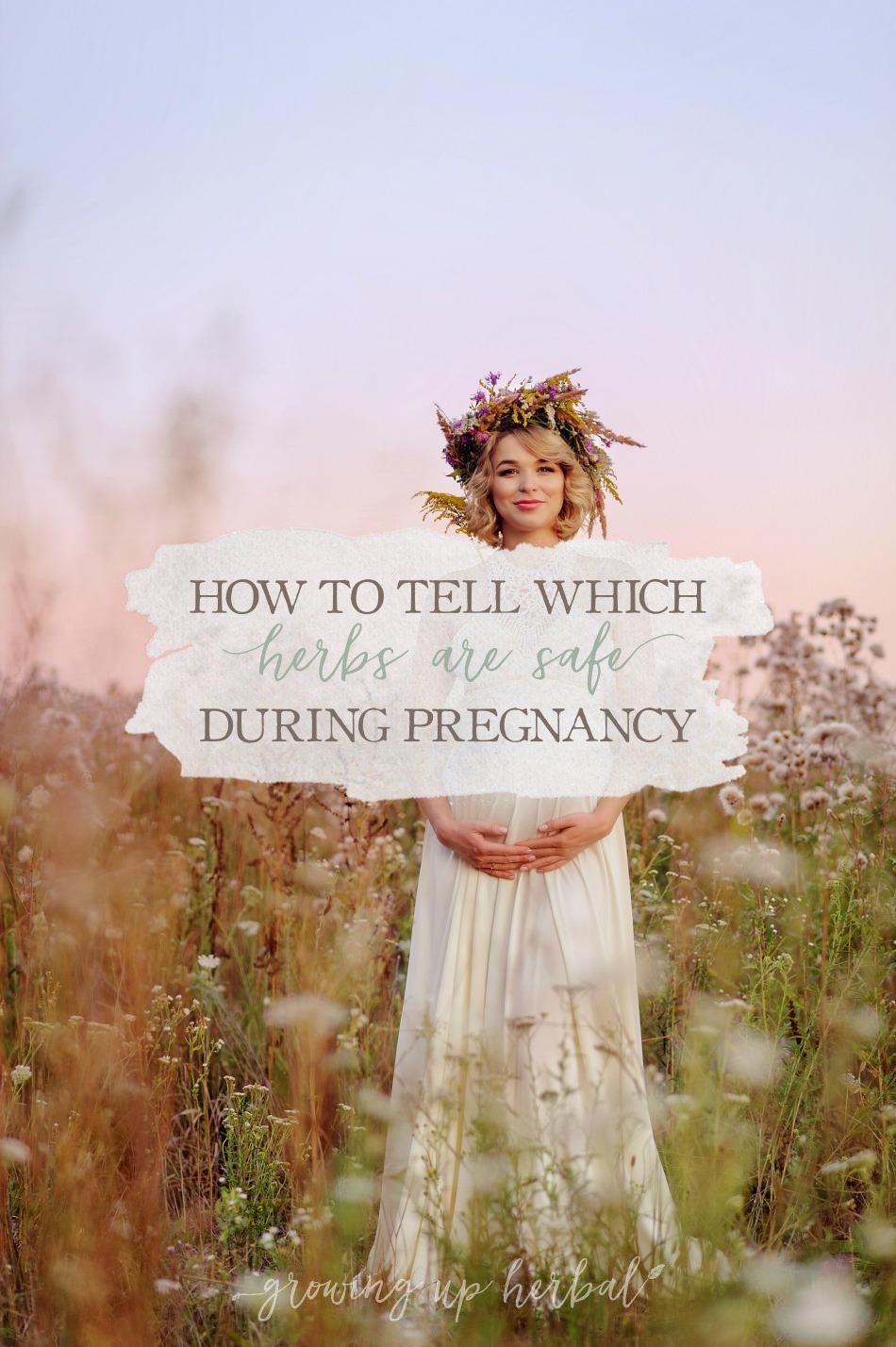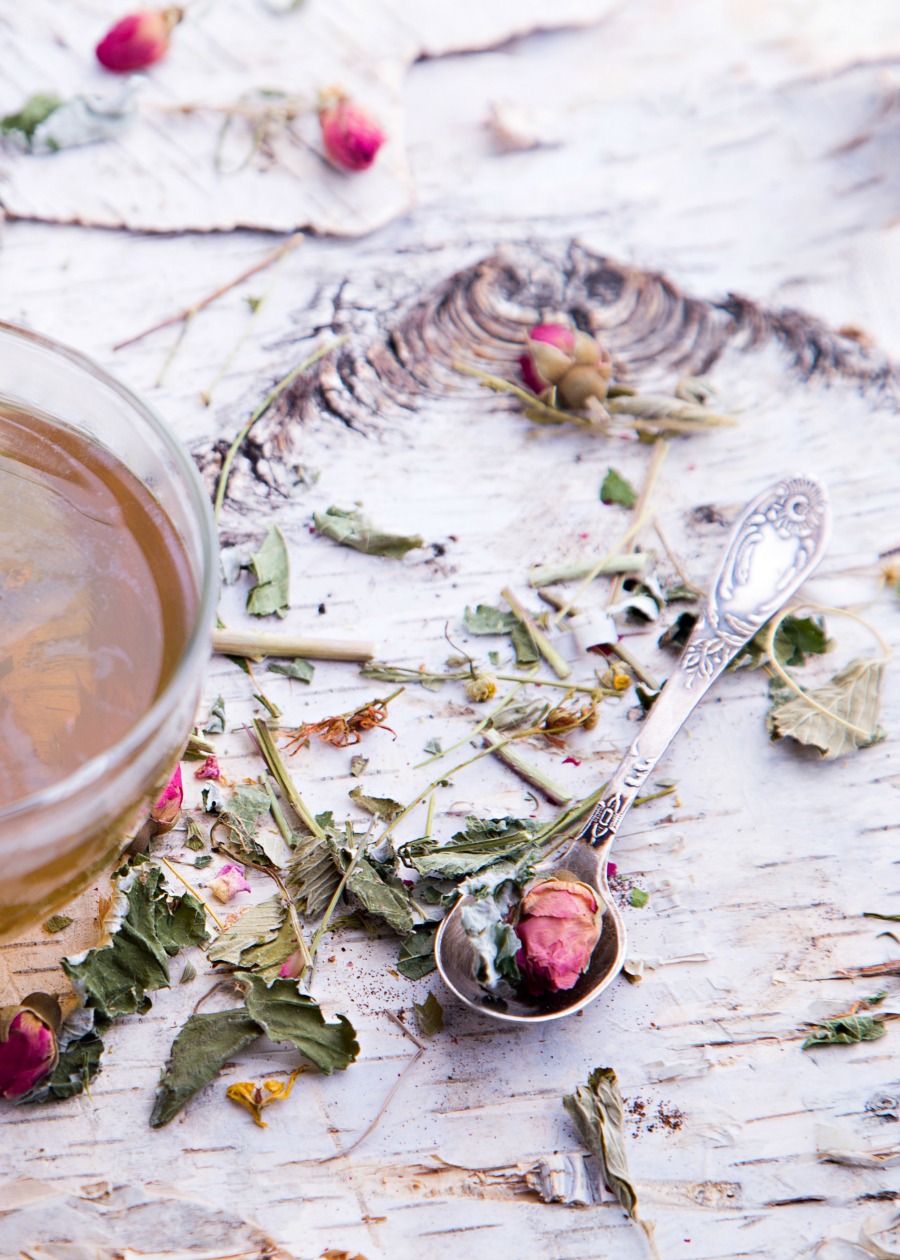
Are you pregnant?
If so, you may be wondering how to tell which herbs are safe during pregnancy (and which aren’t)?
If that sounds like you then you’re in for a treat because today I’m sharing how you can figure out which herbs are and aren’t safe for you to take during pregnancy.
Now before I get into the details, let me quickly address the topic of herbal safety for the average person who’s a beginner at using herbs.
Herbs Are Incredibly Safe
Herbs, compared to many pharmaceutical medicines, are very safe, especially when used correctly.
In fact, the most common “side effects” from herbs are headaches, nausea, and perhaps a rash if you take something that doesn’t agree with your body. [1] This is why I always recommend you test herbs for allergies before taking a large dose of a new herb.
For most people, herbs are used to gently nudge the body back into a more balanced, healthy state, and these “gentle nudges” come from the chemicals found in the plants.
Unfortunately, though, little is known of the effects herbs can have on a pregnant woman or her baby. This is because it’s rare to conduct studies on women using herbs (or pharmaceutical medicines) during pregnancy. In fact, herbalist, midwife, and medical doctor, Aviva Romm, says in her blog post – Herbs In Pregnancy, What’s Safe & What’s Not, [3]
“Even medications previously thought to be safe in pregnancy, including Tylenol, have now been found to cause potential problems for baby.” – Aviva Romm, MD
I think it’s safe to say that pregnancy is a time to be cautious about many things that are normally okay, and it’s best to stick with mild herbs or medicines that have a lot of use and evidence behind them. Eating healthy diets, minimizing toxins, and getting plenty of rest and fresh air are all great ways to keep yourself healthy while baby is growing and forming in your body. Not only do these things nourish you, but they nourish your little one too.
However, ailments happen… even when you’re pregnant, and if you want to steer clear from strong medications, herbs may be more appealing to you.
If that’s the case, let’s look at 4 things you should consider about each herb you may be taking in order to figure out if it’s safe for you during pregnancy. Keep in mind that these suggestions are focused on you doing some research on the individual herbs or herbs in the formulas you may be taking.
4 Ways To Tell Which Herbs Are Safe During Pregnancy
1. Timing Is Everything
The first way to determine if an herb is safe during pregnancy is to pay attention to what trimester of pregnancy you’re in.
When it comes to herbs and pregnancy, most doctors, midwives, and herbalists will be very cautious okaying herbs during the first trimester as this is such a crucial time for baby’s development.
Herbs that are okay to use during the first trimester tend to be nutritive herbs that have a long history of safe use. These herbs are often called “tonics” which mean that they tone and nourish the body, and many often have an affinity for a particular body system. These herbs are mostly food-like herbs that have high vitamin, mineral, and trace mineral content such as alfalfa, astragalus, chamomile (small amounts only), dandelion leaf, oat straw, nettle, red raspberry, and many culinary herbs.
These herbs are often taken in small, frequent doses as teas, especially during the first trimester. This can provide a good bit of vitamins, minerals, and water to hydrate the body, and the herbs aren’t too strong as to overwhelm the body during pregnancy.
The second trimester tends to be the safest time to take larger doses of herbs, but you’ll want to get a green light from your midwife or OB as well as pay attention to how you feel when you’re taking them.
The third trimester is another time where taking herbs tends to be fine although if you have a tendency to go into labor early, you may want to be more careful about taking certain herbs (which we’ll talk about below) or large doses of herbs.
2. Previous Pregnancy History
The second way to determine if an herb is safe during pregnancy is to keep your past pregnancy history in mind.
If you have a tendency to miscarry, to bleed during pregnancies, to have swelling or high blood pressure, or to have early labors, you’ll want to avoid certain herbs that may otherwise be okay during pregnancy.
This will be very specific to each individual person so it’s best to consult your midwife or OB if this applies to you.
3. Herbal Actions Contradicted During Pregnancy
The third way to determine if an herb is safe during pregnancy is to know the action the herb may have in your body.
Some herbal actions are contradicted or not recommended during pregnancy.
Many of the herbs that are discouraged during pregnancy are herbs that have the potential to stimulate uterine contractions which can lead to a miscarriage or preterm labor, especially if you are prone to those situations in the first place. These herbs are called “emmenagogues” or “abortifacients,” and they bring on menses or cause one to start bleeding.
Herbs that have a high volatile oil content are also not recommended in large, frequent doses during pregnancy. Volatile oils have also been known to stimulate uterine contractions which can lead to miscarriages in some women. Many of these herbs are culinary herbs so don’t be alarmed and think you can no longer use sage or thyme in your food. Culinary amounts of herbs are not the issue here. It’s larger doses that are taken on a regular basis that is the primary concern.
Strong laxative herbs are also not recommended during pregnancy as this can stimulate uterine contractions. Instead, milder, gentler laxative herbs can be used under the supervision of an herbalist.
Another herbal action to use caution with during pregnancy are “hormonal” herbs or herbs that affect the hormone levels. As you probably know, hormone levels are what sustain pregnancy so you don’t want to go taking herbs that will either increase or decrease hormone levels in your body without the guidance of a herbalist experienced in women’s health. [2]
4. Cautions Given In Herbal Literature
One of the last ways to figure out whether a herb is safe or not safe to take while pregnant is to look it up in several different herbal texts and see what the author has to say about it.
Most authors of herbal literature do a lot of research when it comes to writing a book, and most always include precautions, contradictions, or warnings for each individual herb included in the materia medica section of their books. This is a great place to find out if a herb you’re considering taking is a no-no during pregnancy.
Better Safe Than Sorry
As you can see, there are several different ways to go about figuring out which herbs are okay to take while pregnant.
However, if you go through all of these suggestions and you’re still not sure about a particular herb, the best thing to do is hold off on taking it until you can talk it over with your midwife or OB. They may automatically say no in order to play it safe, but when it comes to your growing baby, safe is better than sorry!
CLICK HERE to read another great article about herbs to avoid during pregnancy and breastfeeding for more information on the subject.
Curious about essential oil safety during pregnancy? Heather, over at Mommypotamus.com, has written some great posts on essential oils that are safe during pregnancy and those that aren’t… complete with printable lists if you need them. Enjoy!
Do you have any suggestions or tips for determining which herbs are safe during pregnancy? If so, share them with me in the comment section below!
REFERENCES:
- Foret, Rosalee de la. (n.d.). Introduction to Herbal Cold Care. Retrieved February 1, 2016, from http://courses.learningherbs.com.
- Parker, S. (2008). The naturally healthy pregnancy: Whole health for your whole pregnancy. Calhoun, LA: Dewdrop Publishing.
- Romm, A. (2015, March 04). Herbs in Pregnancy: What’s Safe & What’s Not. Retrieved February 01, 2016, from http://avivaromm.com/herbal-medicines-in-pregnancy-safety

[…] pregnant mommy need to know what is and isn’t safe during pregnancy. Lucky for us Meagan from Growing Up Herbal has created a great list for all you herbal […]
When you say dandelion is nutritive and safer do you mean dandelion leaf and root? Or just leaf? TY!
Dandelion leaf is safe as most of dandelion’s nutritional content is found in its leaves. However, the root can have some mild bitter and laxative properties. While dandelion isn’t considered a stimulating laxative, there is a chance that using the root could bring about contractions for those who are sensitive to its digestive effects so it may be best avoided during pregnancy. I’ve updated the post to clarify further. Great question by the way!
What about lemon balm during pregnancy?
Off the top of my head, I think lemon balm is fine during pregnancy.